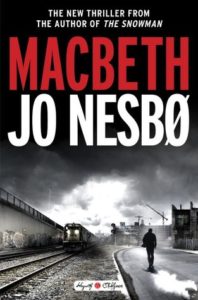Every Tuesday Vicki at I’d Rather Be At the Beach hosts First Chapter, First Paragraph, Tuesday Intros, where we share the first paragraph or two of a book we are reading or thinking about reading soon.
Mine comes from Macbeth by Jo Nesbø.

The shiny raindrop fell from the sky, through the darkness, towards the shivering lights of the port below. Cold gusting north-westerlies drove the raindrop over the dried-up riverbed that divided the town lengthwise and the disused railway line that divided it diagonally. The four quadrants of the town were numbered clockwise; beyond that they had no name. No name the inhabitants remembered anyway. And if you me those same inhabitants a long way from home and asked them where they came from they were likely to maintain they couldn’t remember the name of the town either.
The raindrop went from shiny to grey as it penetrated the soot and poison that lay like a constant lid of mist over the town despite the fact that in recent years the factories had closed on after the other. Despite the fact that the unemployed could no longer afford to light their stoves.In spite of the capricious but stormy wind and the incessant rain that some claimed hadn’t started to fall until the Second World War had ended by two atom bombs a quarter of a century ago. In other words, around the time Kenneth was installed as police commissioner. From his office on the top floor of police HQ Chief Commissioner Kenneth had then misruled the town with an iron fist for twenty-five years, irrespective of who the mayor was and what he was or wasn’t doing, or what the powers-that-be were saying or not saying over in the Capitol, as the country’s second-largest and once most important industrial centre sank into the quagmire of corruption, bankruptcies, crime and chaos. Six months ago Chief Commissioner Kenneth had fallen from a chair in his summer house. Three weeks later, he was dead. The funeral had been paid for by the town – a council decision made long ago that Kenneth himself had incidentally engineered. After a funeral worthy of a dictator the council and mayor had brought in Duncan, a broad-browed bishop’s son and the head of the Organised Crime in Capitol, as the new chief commissioner. And hope had been kindled amongst the city’s inhabitants. It had been a surprising appointment because Duncan didn’t come from the old school of politically pragmatic officers, but from the new generation of well educated police administrators who supported reforms, transparency, modernisation and the fight against corruption – which the majority of the town’s elected get-rich-quick politicians did not.
I’ve never read this author. I like the intro so I’d keep reading a bit more and then decided.
I’ve read a few of his Harry Hole series and enjoyed them.
I have heard good things about this book but I feel like I need to be more familiar with the source material first.
I’m a little worried about that too. It’s been so long since I’ve read Macbeth.
I.like the intro. I like the change in the air thing I’m feeling.
I like the intro too. He packs a lot into those two paragraphs.
I am curious about this author. Thanks for sharing…and for visiting my blog.
I’ve read several of his series featuring Harry Hole, but none of his stand-alones.